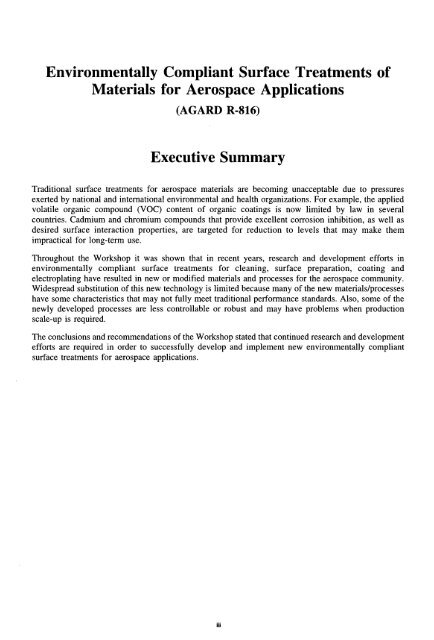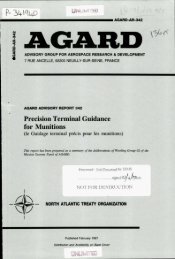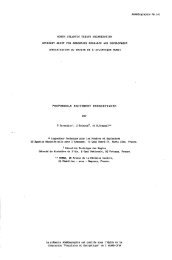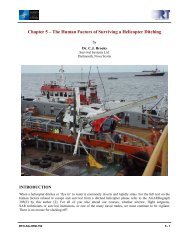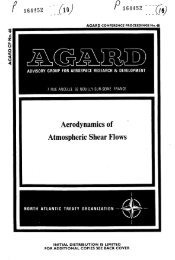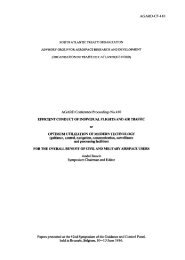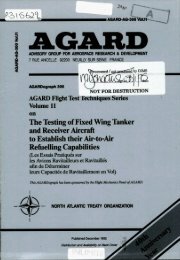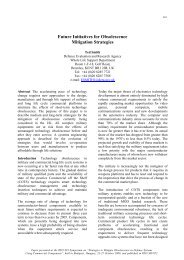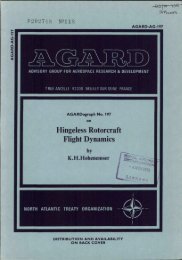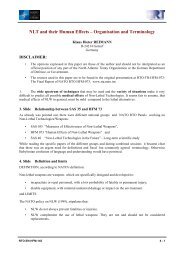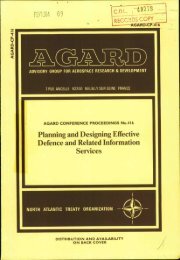- Page 1: (D - I fravq K 5 A dK U l b - $ ADV
- Page 6 and 7: Les techniques de traitement de sur
- Page 8 and 9: - Phosphoric Sulfuric Acid Anodizin
- Page 10 and 11: Chairman: Prof. 0. Sensburg Chief E
- Page 12 and 13: T-2 Each NATO country identified re
- Page 14 and 15: T-4 chrome replacement. However, th
- Page 17 and 18: SUMMARY ENVIRONMENTAL PERSPECTIVES
- Page 19: Since the largest amounts of Chrome
- Page 22 and 23: 2-2 Plusieurs documents ont donc Ct
- Page 24 and 25: 2-4 4 - REVeTEMEms MI~TALLIQUES Pan
- Page 26 and 27: 2-6 Solvants : reduction des emissi
- Page 28 and 29: 4-2 cadmium, the use of acid proces
- Page 30 and 31: 4-4 approvals, provided general adv
- Page 32 and 33: 4-6 this section illustrate how cos
- Page 34 and 35: 5-2 development is geared to reduce
- Page 36 and 37: DEFINING POLLUTION II.1.IiS1RAllOiu
- Page 38 and 39: 5-6 ILLUSTRATION 7 DoD METAL FINISH
- Page 40 and 41: ILLUSTRATION 11 DoD METAL FINISHING
- Page 42 and 43: 6-2 (PANS) toxiques pour les plante
- Page 44 and 45: 6-4 Cette organisation est chargee
- Page 47 and 48: SUMMARY US ENVIRONMENTAL TRENDS AND
- Page 49 and 50: acetaldehyde; acrolein; acrylamide;
- Page 51 and 52: In the US DoD, an extraordinary eff
- Page 53 and 54: 28 Connections Between Audit Policy
- Page 55 and 56:
Primer and Topcoat Applica- tion Op
- Page 57:
Depainting 3perations (cont.) Chemi
- Page 60 and 61:
8-2 2 CORROSION INHIBITORS 2.1 Intr
- Page 62 and 63:
8-4 L .- E" L Q .Id .- C (U a .- E
- Page 64 and 65:
8-6 None Inhibitor Cerium( Ill) sul
- Page 66 and 67:
8-8 i .- - 1 E E i 0 4- 0.2 .- $ 0.
- Page 68 and 69:
8-10 3) 4) 5) 7) 5) The addition of
- Page 70 and 71:
9-2 Traditional Figure 1 Traditiona
- Page 72 and 73:
I II Figure 3 Baftle conflgurstions
- Page 74 and 75:
1-6 enlciently removes oxygen tube-
- Page 76 and 77:
9-8 2.4.1 Cleaning Theory CO2 pelle
- Page 78 and 79:
9-10 Cleaning processes which produ
- Page 80 and 81:
10-2 has begun to tighten restricti
- Page 82 and 83:
10-4 grit-blasted with silicon carb
- Page 84 and 85:
10-6 should be sufficient. Safety a
- Page 86 and 87:
10-8 Wright Laboratory Small Busine
- Page 88 and 89:
10-10 SOL-GEL I 0 500 1000 1500 CON
- Page 90 and 91:
7.0 CONCLUSIONS Semiannual Regulato
- Page 92 and 93:
11-2 about another 3 pm of metal as
- Page 94 and 95:
114 8. CONCLUSIONS The PSA process
- Page 96 and 97:
11-6 In al c c In 2 n 2 U al c m 2
- Page 98 and 99:
11-8 Fig. 2: Unnotched specimen for
- Page 100 and 101:
11-10 Fig. 6: 1 Rating standards fo
- Page 102 and 103:
'I I
- Page 104 and 105:
12-2 Ted Number FIG. 2 Relah“ per
- Page 106 and 107:
folmd that the improved adhesion co
- Page 108 and 109:
1 2-6 Weihull plots show the ncciin
- Page 110 and 111:
12-8 replacing Cd/Cr electrnplating
- Page 113 and 114:
EVALUATION OF AQUEOUS DEGREASING AS
- Page 115 and 116:
Finally, the metal etch rate of the
- Page 117 and 118:
C] Foaming Characteristics Foaming
- Page 119 and 120:
Table 2: SOILS IDENTIFIED NAME MANU
- Page 121 and 122:
Table 7: SOILS USED FOR PILOT LINE
- Page 123 and 124:
SUMMARY Cadmium substitution on air
- Page 125 and 126:
corrosion products on the coating s
- Page 127:
Table 4 Neutral salt spray data - a
- Page 130 and 131:
16-2 elecao deposition of materials
- Page 132 and 133:
16-4 FIGURE 3 DESIRED CHARACTERISTI
- Page 135 and 136:
Experiences in Maintenance and Over
- Page 137 and 138:
Together with oxigen and other envi
- Page 139 and 140:
Fig. 13 Shows a substrate plan, whe
- Page 141 and 142:
IV. Corrosion Treatment After strip
- Page 143 and 144:
2. 2.1 2.2 2.3 Actually, chromate-c
- Page 145 and 146:
VI VI .- C X 0. VI 2 L 0 U I I XI !
- Page 147 and 148:
PRIMW CRACKS - Fig. 3 - -DATING - S
- Page 149 and 150:
- Fig. 7 - - Fig. 8 - I 17-15
- Page 151 and 152:
Compressive stress Correllation of
- Page 153 and 154:
e C-12- 17-19 188-SRMIVC-001 t Fig.
- Page 155 and 156:
Is) .- C R .- R L + cn I x L O II U
- Page 157 and 158:
VOLUME VH = 25 X 25 X 8 = 5000 m’
- Page 159 and 160:
.. I '. ,. I I 17-25 I 0 N m .r LL
- Page 161 and 162:
SulMARY QUALIFICATION OF CIIROMATE-
- Page 163 and 164:
- Resistance to high humidity cycli
- Page 165 and 166:
laboratories is usually quite good.
- Page 167 and 168:
- Type 2 Requiring 5000 hrs neutral
- Page 169:
12 11 10 9 8 3 2 1 0.10 0.05 . . ..
- Page 172 and 173:
202 - €iWI 5% 5% Figure I - Break
- Page 174 and 175:
20-4 identifies those coatingdproce
- Page 176 and 177:
The single most critical performanc
- Page 179:
1. Recipient’s Reference 6. Title
- Page 182:
3 WYUMITED m.


